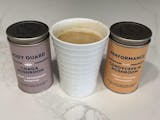The Mogu lions name extract is the best on the market. Mixes relatively smooth and is safe and effective.
I have literally not found a better product than what they offer.
Plus quick shipping and nice, secure packaging.
This product helped me focus, it didn’t give any jitters. It’s subtle but noticeable! Exactly what I was hoping for!
Mogu mushrooms is incredible. I will be coming back for more. Products come from a trusted source with excellent quality.
I’m extremely pleased with this Organic Cordyceps militaris supplement. The quality is outstanding — fresh, clean, and clearly well-sourced. It blends easily into my smoothies and tea without any strong aftertaste.
Since adding it to my routine, I’ve noticed improved energy, stamina, and focus throughout the day, especially during workouts. I also appreciate that it’s certified organic with no fillers or additives.
Great value for the quality provided — I’ll definitely continue using it!

